Some hosted and some were sheltered; the doors which opened during the Kosovo war are never forgotten, nor is the taste of the bread shared amidst fear and anxiety.
The sack of flour, the tractor, and the rooms once used as oda, traditional Albanian guest rooms, evoke memories of a lifelong friendship and the common home shared by Abazi, Rama, Salihu, and Fatmir during the war. For two of them, it was a house with deeds, and for the other two, it was a house of God, a friend, and the war.
These four men, from four different parts of the country, first met while fleeing their homes during the Kosovo war of 1998-1999. At the time they were young men with small children, and all they sought was a safe place for themselves and their families. The light in their eyes still carries the memory of each other and the door that opened to them in their darkest hour.
Salih Morina, 63, from the village of Gllareva in the municipality of Kline, and Ramë Hamiti, 57, from the village of Vajnikë in the municipality of Skenderaj, are just two of the thousands of Kosovo Albanians who were forced to leave their homeland because of the brutal offensives carried out by the Milosevic regime.. The two men returned after a few months to rebuild their lives from scratch.
Morina and Hamiti fled the war however they could, travelling by foot and tractor. Their perilous journeys led them to the homes of those willing to take in fleeing families. The Morina’s stayed in the home of Abaz Zahiti, now 75, in the village of Kçiq i Madh in the municipality of Mitrovica, and the Hamiti’s with the family of Fatmir Kovaçi in the village of Novolan in the municipality of Vushtrri. These men forged memories that would forever shape the rest of their lives.
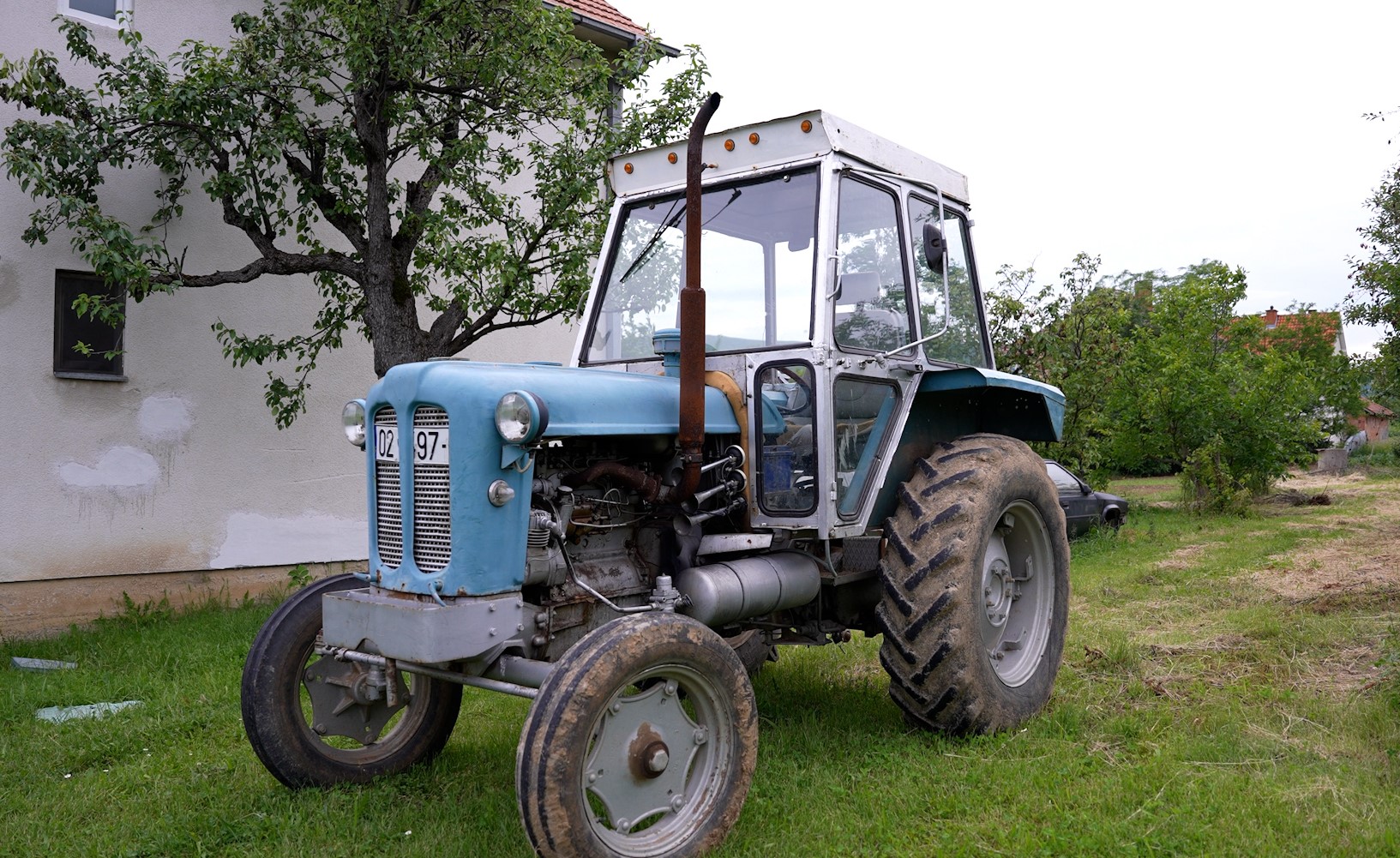
Tractor used during the war by the Kovaçi family, Novolan, Vushtrri. Photo:BIRN
Many families opened their doors to shelter those fleeing from Serb forces, helping people who had nowhere else to go. Although there is no official record of who left their homes and who welcomed others, each person carries a story of their escape during the war.
Now, 25 years later, they commemorate those moments . Zahiti and Morina reunited again after a long time in the courtyard of the old house in Kçiqi i Madh, while Hamiti and Kovaçi saw one another in a new house in Vajnike.
The war brought them into each other’s homes, and, without hesitation, they opened their doors and shared the same piece of bread.
Common home of war
With a mix of longing and sorrow, Abaz Zahiti reminisces about the spring day during the war when he opened his door to Salih Morina and his family, who had fled their home in Gllareva due to the advancing Serb forces. Zahiti, a former chief worker for the railways in Mitrovica, does not recall whether it was April or May when he gave up his home’s oda, but he will never forget the terrified family of six to whom he offered a safer place than the one they had left behind.
Zahiti vividly recalls the day that the mayor of Kçiq i Madh informed him that families from Gllareva would be brought to his home. When he returned, he found Salih and his brother already there. That very day, he decided to keep them in his home until they felt safe to return to their village. It wasn’t because Kçiq was safer from the war, but because Gllareva was more at risk due to the nearby military presence.
“I told Salih and his wife, ‘Look here, this is the flour, this is what I have, we will eat together until it runs out’,” Zahiti recalled in an interview with BIRN.
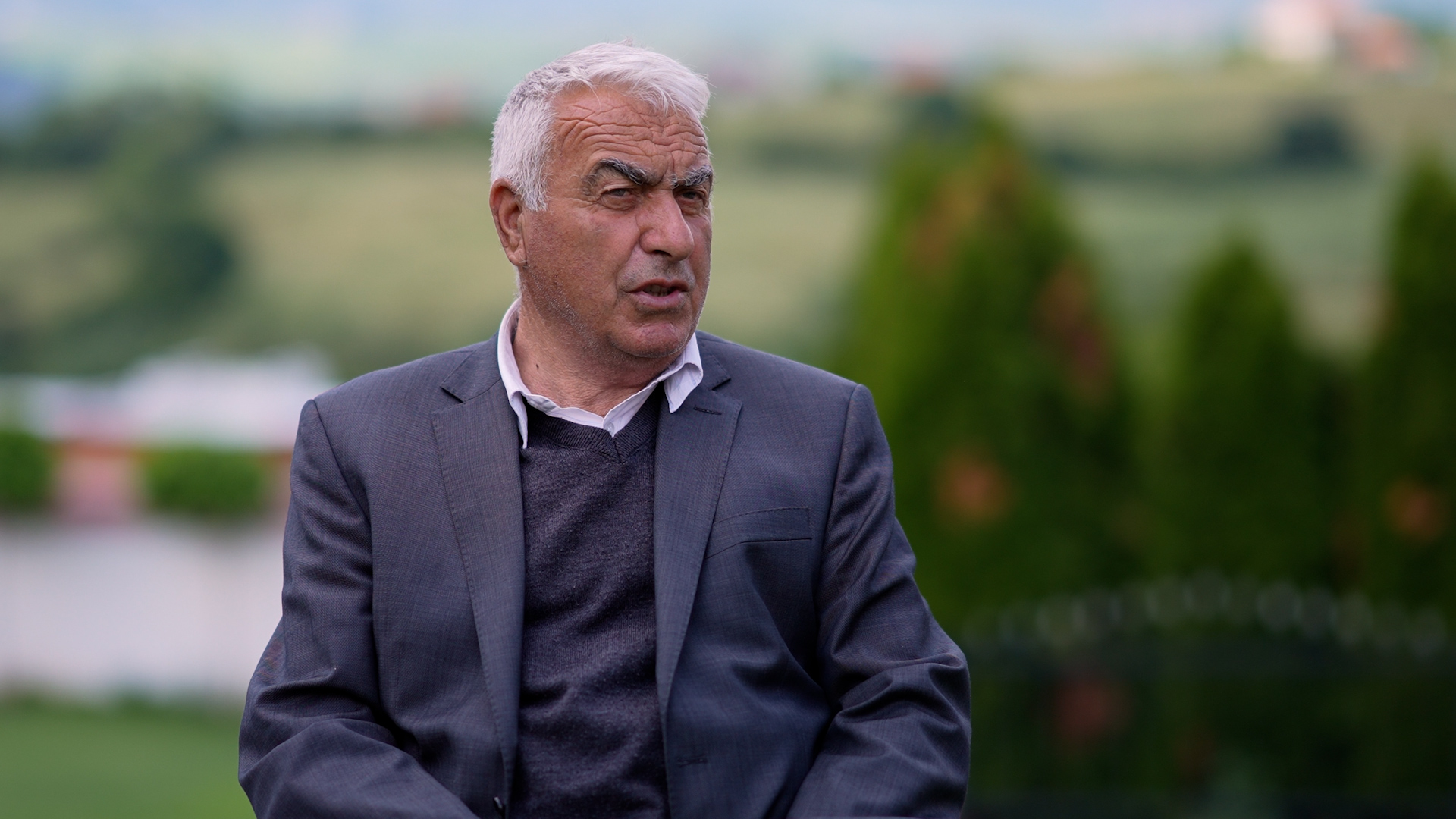
Abaz Zahiti from Kçiq i Madh, Mitrovica. Photo; BIRN
Twenty-six years later, the 75-year-old, known in the village as haxhi Abazi, cannot forget Salih’s face after hosting him for months, until he decided to return to his home.
“I can’t get him out of my mind (Salih Morina). He had a brave wife, and he himself was a brave man. I got along very well with them,” Zahiti said, recalling that he had only seen the man from Gllareva once since the war.
Zahiti hosted around 30 other families during the war, both relatives and strangers, and mostly from the Drenica region, in the basement of his home.
Despite Zahiti being arrested and then sent to Albania, his family continued to host the Morina family until Kosovo’s liberation on June 12, which occurred while Zahiti was in Albania.
En route to reunite these families, at the entrance of the village, the BIRN team met Salih Morina, who shared the same story from the perspective of the displaced. His face was almost identical to Zahiti’s description, the only difference being the wrinkles now covering Morina’s forehead.
Before moving to Kçiq i Madh, but after being displaced from Gllareva, Salih Morina’s family had found shelter in various villages for months, first with two relative families in Abri, Skenderaj, until the encroaching Serb army forced them to move to Shipol, Mitrovica. There, the emergency staff directed them to the Zahiti family.
“I thank Abazi for providing my family with bread and wood, he gave flour and wood for that season. I always wish them well because they shared their bread and gave it to my family. They gave us a room to stay, and we stayed there, ate there,” said Salih Morina, still emotional when sharing his story 25 years later.
The 63-year-old says that, even though two and a half decades have passed, there isn’t a day he doesn’t think about the families who opened their doors because his house had burned down and his family had nothing. Salih Morina and his wife had four young children then, their eldest daughter only nine years old.
Morina, with tears in his eyes, spoke of how “Twenty-five years go by, but good deeds and kind words can never be forgotten. I have nothing but good words for them. I could write a small novel about the good deeds they did.”
“I felt sad for leaving my home, but more so for leaving the army halfway through, (after) seven months,” he said regretfully, explaining that he worked in the kitchen and stood guard for the Kosovo Liberation Army, KLA,. “But I had no choice with young children. My children were unwell and my wife was anaemic and in the hospital,” Morina shared.
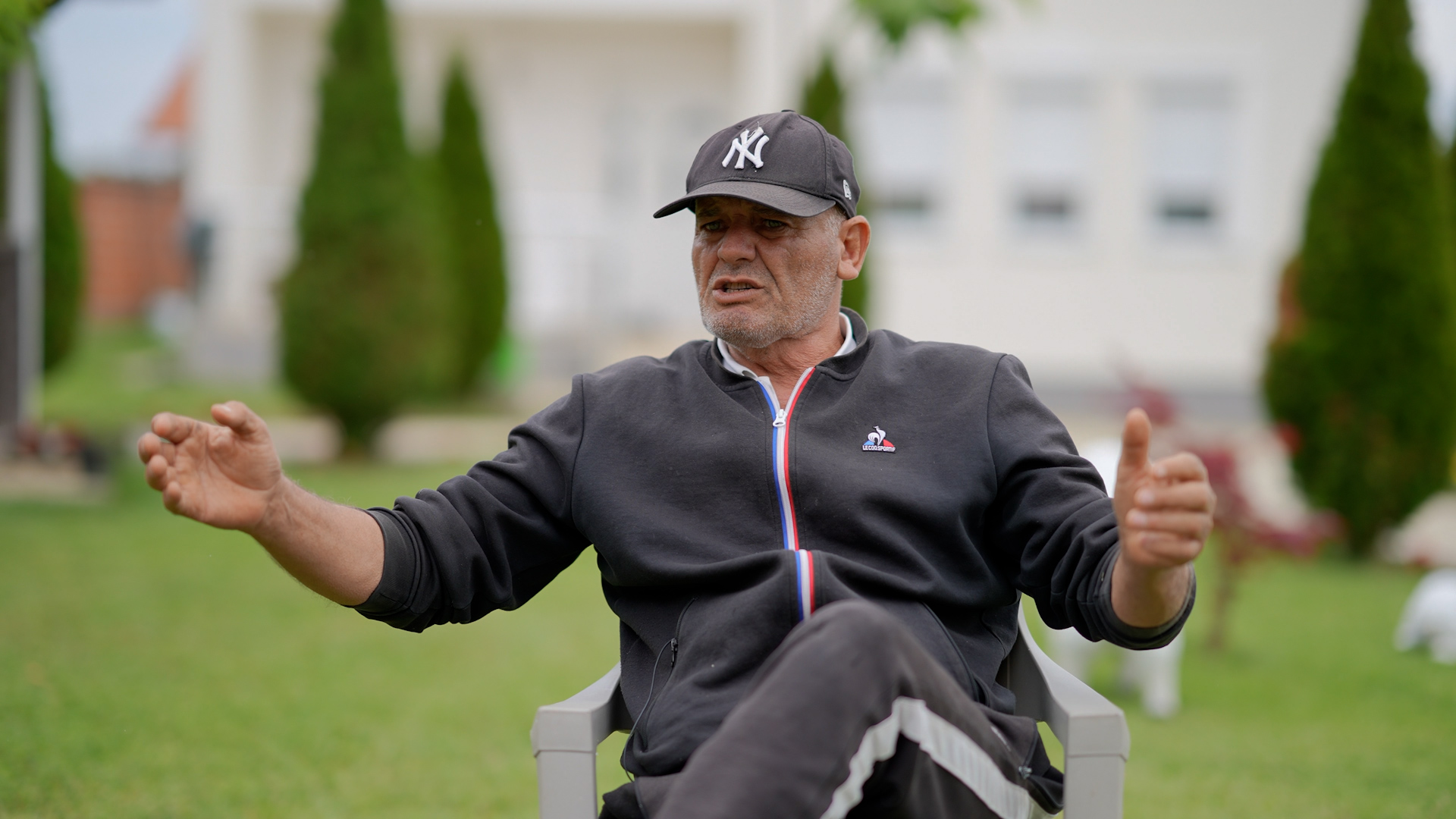
Salih Morina from Gllareva, Klina. Photo:BIRN
Every Kosovo Albanian left their home when Serb forces entered their communities. Not everyone was a host, but everyone was a “refugee” for a certain period, whether within Kosovo, Albania, or North Macedonia.
Not far from Kçiq i Madh, another connection between families was being forged. The Kovaçi family of Novolan provided a safe haven for those displaced from Drenica. The story of the Kovaçi’s and Novolan, never before shared with the public, is another testament to the generosity and resilience of the people of Kosovo during the war.
In Fatmir Kovaçi’s yard, Ramë, Muhamet, and Pajazit Hamiti from Vajniku found a home, and they were not alone. In August 1998, Novolanorganised to shelter over 1,000 displaced people from Drenica, at a time when the villages in that area were being burnt to the ground by Serb forces.
Fatmir Kovaçi, now 59 years old, has a photographic memory and can recall every detail of the war. To ensure the safety of his people, he organised accommodations so that no one had to sleep under the open sky amidst the sounds of war. “Whoever had a small space at home, they gave it to a family,” he remembers.
“On August 8, 1998, the first displaced from Drenica arrived around 00:30 at night. We were asleep, they were coming by tractors and cars, and we woke up and prepared, went to the Rrustemi neighbourhood, and stopped there, organising with the neighbourhood,” Kovaçi recounted, recalling that, within half an hour, they managed to shelter about 25 families who had arrived via the connecting roads of Dubovc and Galica, mainly from the villages of Vajnikë, Açarevë, and Shupel.
Kovaçi, an activist and core member of the village council at the time, explains that he and his brothers sheltered around 25 members of the Hamiti family. In the oda next door they sheltered travellers and soldiers, providing bread for those who passed through their doors.
“It wasn’t just me, but everyone who had a small piece of room declared it and took in and sheltered people, making them part of their family,” said Kovaçi. An emergency reception and shelter team was formed, consisting of about 10 people
Kovaçi fondly recounted how, even though the times were tough, with war everywhere and the hosts also feeling unsafe, this did not stop them from getting along well with the displaced in their family, to the point they could not distinguish them from their blood relatives.
The family from Vajnikë was sheltered for about three months until the Kovaçi’s had to leave their village to find shelter in Albania – hosted by a family with whom they still maintain friendly relations.
“We set out to help people in need, because when you don’t need help, you don’t ask for it. People left their homes, and not opening the door for them is a disgrace, I don’t know what kind of act that would be,” said the 59-year-old.
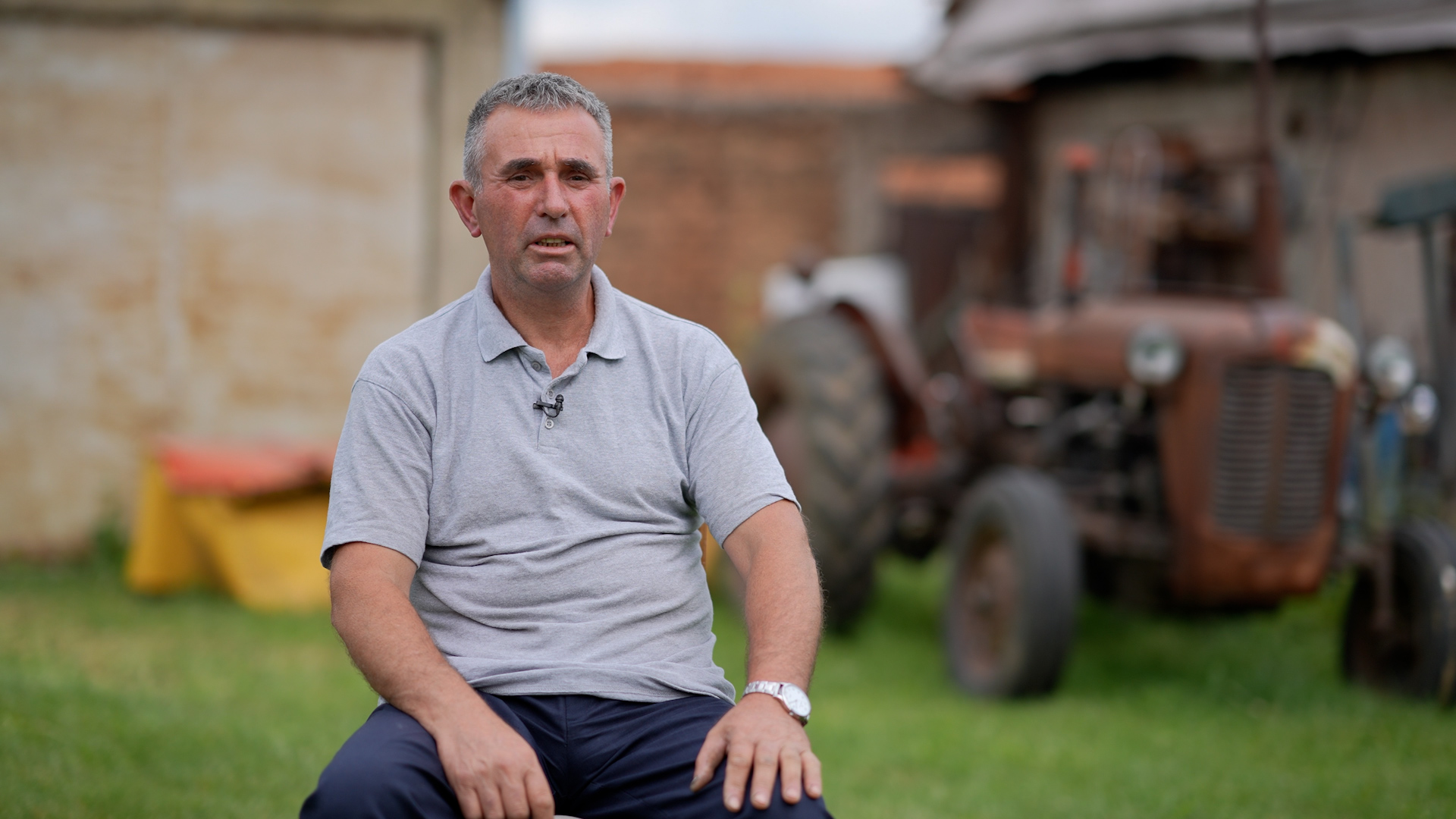
Fatmir Kovaçi from Novolan, Vushtrri. Photo:BIRN
Rame Hamiti feels extremely grateful for the generosity and hospitality of his former hosts. He spoke of how he can find no words to describe the respect he feels for the Kovaçi family. The connection between the two families persists to this day.
Hamiti remembers the day he received the news that he would be sheltered by the Kovaçi family, about whom he had heard from his relatives, who had been sheltered there two weeks before his arrival.
“I had to send my wife to grind with the tractor because we ran out of flour. I put my children and wife on the tractor, and we went through Tushilë village, I remember it like today, along the asphalt, we didn’t dare (drive). When we reached Novolan, I just asked for Shaip and Fatmir because my cousin’s son told me. We went, and they were there waiting for us,” he recounted the other side of the story.
Hamiti said he couldn’t stay long in Novolan because he had his mother and brother in Vajniku and he had to stay in his place to support the Kosovo Liberation Army. But he left his wife and children with the Kovaçi family without any fear, having gained trust in their hosts.
“I left the children; that night I stayed too, maybe two nights, I don’t remember exactly. I went because I was in the army. They stayed there for two and a half months or more, I’m not sure. They kept the children with everything, we had no worries about them, they kept them, took care of them, plus they took the children and my wife to the doctor because they were a bit unwell,” Hamiti said, praising his family’s former hosts.
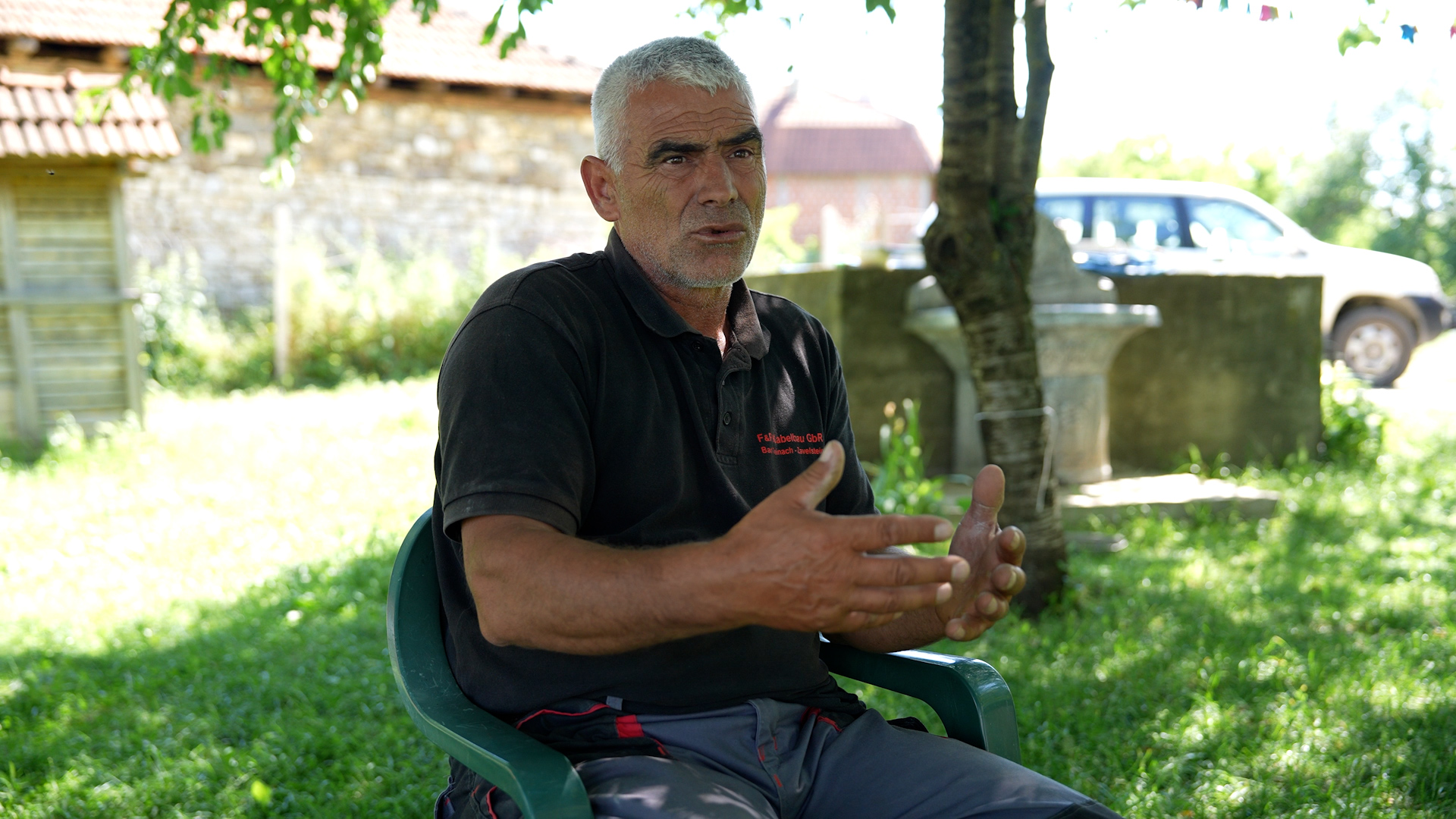
Rame Hamiti from Vajnike, Skenderaj. Photo:BIRN
In these villages, which were also raided by Serb paramilitary and military forces, the sheltered people witnessed crime and torture.
Salih Morina says he witnessed a newborn being kicked right before his eyes, just minutes after he himself was hit on the head while transporting his relatives and others on a tractor near the Smrekonica prison.
“That was the hardest moment for me in this world, when a boy was born in the crowd, and the paramilitaries said, ‘A terrorist is born,’ and they kicked him. But I don’t know if he survived or not because we scattered. That was the hardest moment for me, seeing them kick that two-hour-old baby. I saw the women being stripped and forming a wall where the baby was born,” he recounted.
“We shared the flour together until the last bit”
Bread serves as a reminder of both pain and togetherness. No family has forgotten the flour that was shared, even in meagre portions. They recall the tables set to ensure that everyone could have at least a little bread and salt.. When hosting guests, families understood that their bread would be divided equally.
Even as their tables now overflow, they remember the days of scarcity during the war. With whatever little they had, they ensured no one went hungry. They worked together, setting the table and relying on pogaçe, the traditional Albanian bread, as their main sustenance due to its ease of preparation.
“That’s how we ate at the sofër, the dining table. Maybe two or three times, we ate together,” Abaz Zahiti reminisced about the bread served in his oda.
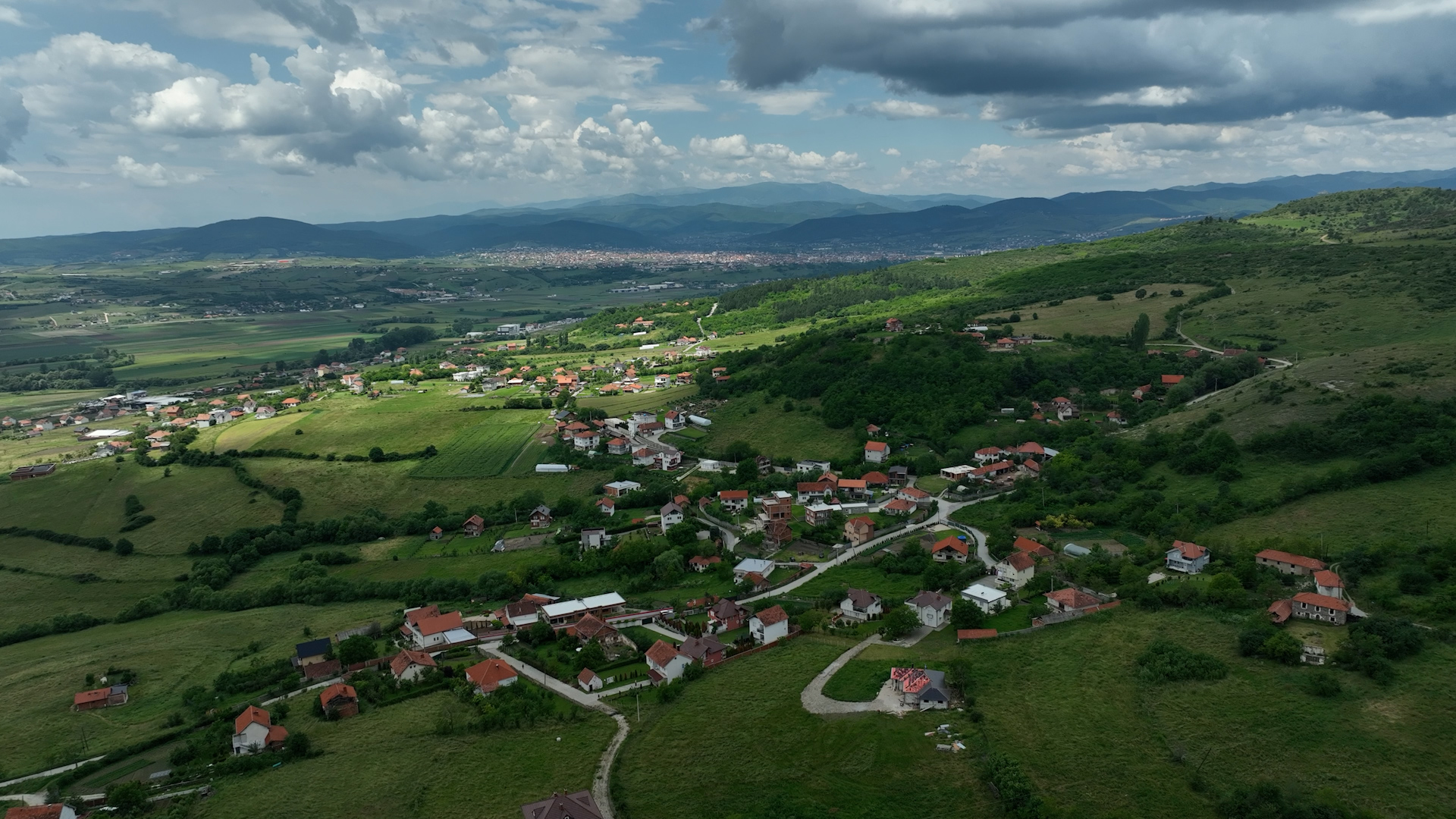
Kçiq i Madh village, Mitrovica. Photo:BIRN
Men, grateful to their wives, acknowledged the women’s role in organising and cooking to comfort guests. While the men worked the land and organised the village to aid those fleeing dangerous war zones, the women stayed up late and prepared food.
“My wife baked all the bread, and Salihu’s wife helped and prepared the meal. Even my daughter, Lirija, pitched in,” Zahiti shared. He expressed admiration for the work done by the women of the family to ensure that there was enough flour and food for everyone.
Fatmir Kovaçi, who owned a farm at the time, declined free flour, believing it wasn’t right to accept when others had less.
Kovaçi, who has four tractors in his yard, one dating back to the war, explained that tractors were used to distribute food. He is now a technical worker at the elementary school in Novolan and also repairs tractors, which still remind him of the war.
“Food was prepared in the oda and the children were cleaned and given milk. We helped as much as we could,” he added, explaining that when the day came to help Drenica, they organised and took 500 loaves of bread to the flour mill, sending them to the school in Likoshan and the mosque in Qirezi. Seeing that cooking conditions were poor, the village women organised themselves and began preparing ready-made food, mainly pies, and sending them to the villages of Drenica.
Ramë Hamiti will never forget the taste of the bread he ate at the Kovaçi house. “We all shared the bread; they gave us their best. We became like family. They welcomed us in a way that couldn’t have been better,” Ramë Hamiti recalled. He says they formed such a strong bond that they feel closer to the Kovaçi family than to some of their own relatives.
“My wife loves them more than some of her own relatives because they spent the most beautiful times (together) during the hardest times,” he said.
Salih Morina will similarly never forget the kindness of Abaz Zahiti’s family and the surrounding community, who all helped him with food. Next to Zahiti lives Naser Miftari, or, as Morina calls him, Naser Shesholli, whose family did not sit down to eat without inviting the Morina family to join them.
“His mother once said, ‘I don’t eat until Salihu comes.’ Thank you, and may your home be blessed in heaven because they loved me a lot,” Morina said.
Ode to oda
Large and well-kept houses now stand on each of the families’ properties As they remember the difficult past, they appreciate their current good fortune. Beyond comparing two different lives, these four men deeply understand the value of freedom.
They no longer have the traditional oda, everything having been renovated and rebuilt since the war. However, Fatmir Kovaçi still preserves relics memorializing his detached oda. Even though the reconstructed houses of Zahiti and Kovaçi look different now, they still call them oda. This name brings forth memories of the time when fleeing families found refuge there.
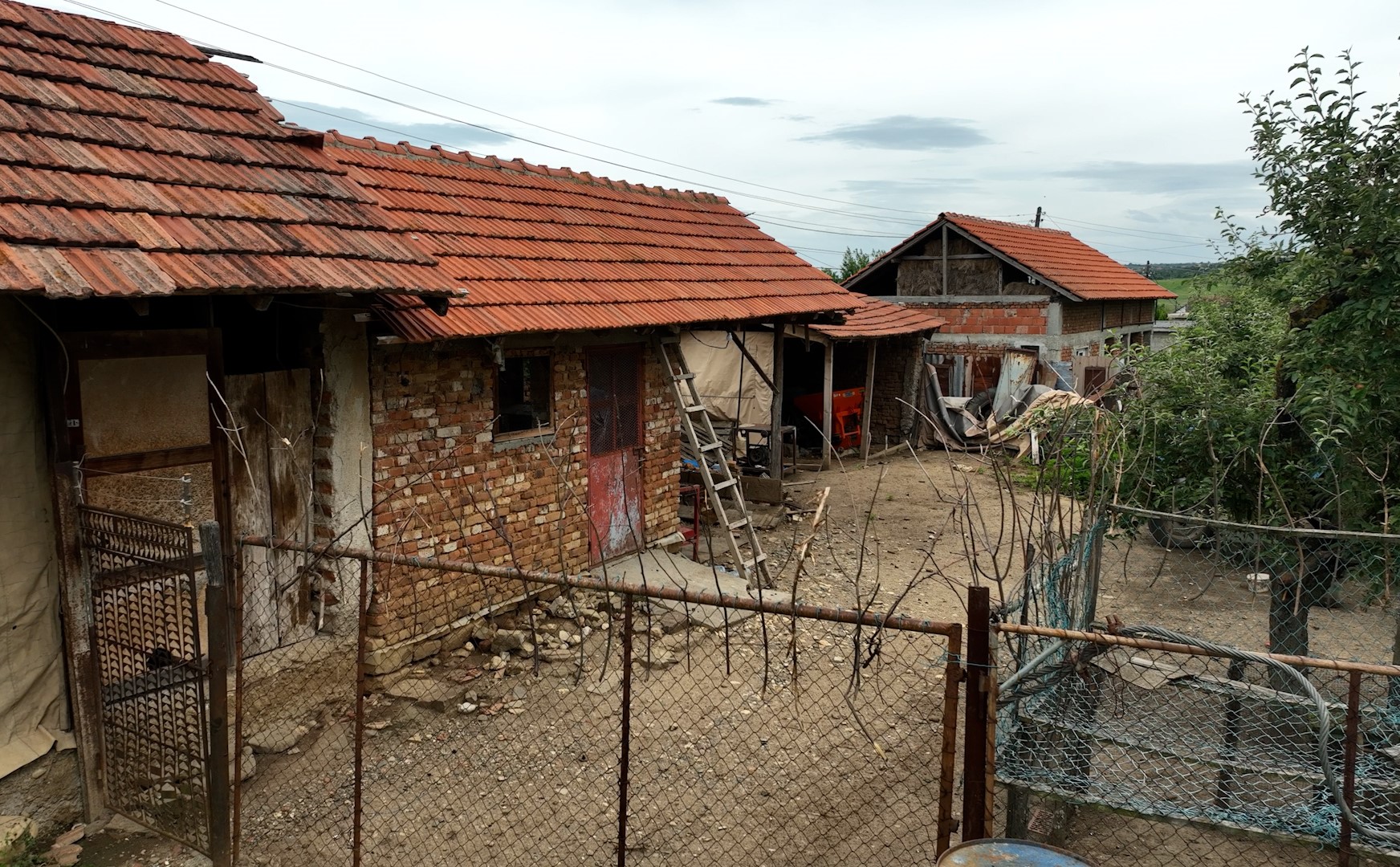
Old houses and oda of Kovaçi’s family in Novolan, Vushtrri. Photo:BIRN
Unlike these two, the houses of Salih Morina and Ramë Hamiti resemble typical Albanian homes, well decorated from the outside. The men expressed a great desire for their houses to be impressive because their old ones were burned during the war by Serb forces. They returned to their villages with nothing and started new lives. They still remember the details of the rooms they stayed in then, from the ceiling to the floor.
“It was like an embassy to me. Now everybody’s houses are like embassies. It was very good, with our things, the cribs, everything in order,” said Ramë Hamiti about the room the Kovaçi family had provided for them, now renovated.
Kovaçi mentioned that he did not have the heart to demolish the oda in the courtyard. He hasn’t even changed the house’s doors; they are the same ones that withstood the war.
“Except for the entrance door to the corridor, it’s still there because I use it for other purposes, like storing wood and other things. My heart tells me there is no chance to fix it as they have, but even to break it down,” said Kovaçi, his face stricken with pain and longing..
For Hamiti, the greatest pain was the day he left the place where he found refuge for months. But he knew it was time to leave because Serb soldiers had arrived in the village of Novolan.
“We felt as empty as the day we left the cave. We didn’t even know where we were going. It was difficult,” he said.
When he returned to Vajnikë, he found nothing. All the houses were burned. Paradoxically, he says he was not upset: “As I came without a roof, I found them burned, but I was not upset”.
The only thing that hurt him was his mother’s room, which had become ashes and ruins. The room still exists, almost destroyed, but is now used for other things.
Salih Morina, recalling the room he stayed in with the Zahiti family, felt a kind of longing for that place. A space that resembles a resting room appears before his eyes,”I still visualize it. I have it in front of my eyes, it looks like a cottage.,”
Morina returned home after the liberation of Kosovo, but he found nothing except a sack of flour. He says that the family from Kçiqi i Madh gave him the money to return.
“When we came back to Gllareva, we didn’t have anything, completely empty. For a year and a half, I lived in the storage room,” he said.
Morina stayed at Abaz Zahiti’s house even after Zahiti was imprisoned. He mentioned that, when he left that day, he was as upset as when he had left his home because he had gotten used to them.
“When I left that day, I was as upset as the day I left, because I got used to them,” Morina confessed, while Abaz Zahiti completed the mosaic of this story. He remembered the same days when he was in prison in Albania; his son from Germany had visited and told him that the family in Kçiqi was good, and the sheltered family at home was good.
Their children are now grown. Many of them accompanied their fleeing parents, while others were born after the war. They say they have told their descendants the story of the refuge and left instructions to maintain friendships with each other. The fact that few of them have remained in Kosovo is painful, as many have migrated abroad for a better life.
The lives of these four men have changed dramatically. Despite the different paths their lives have taken, they have managed to maintain their relationships to some extent. “We talk at weddings, during Bajram, and at our parties,” they say.
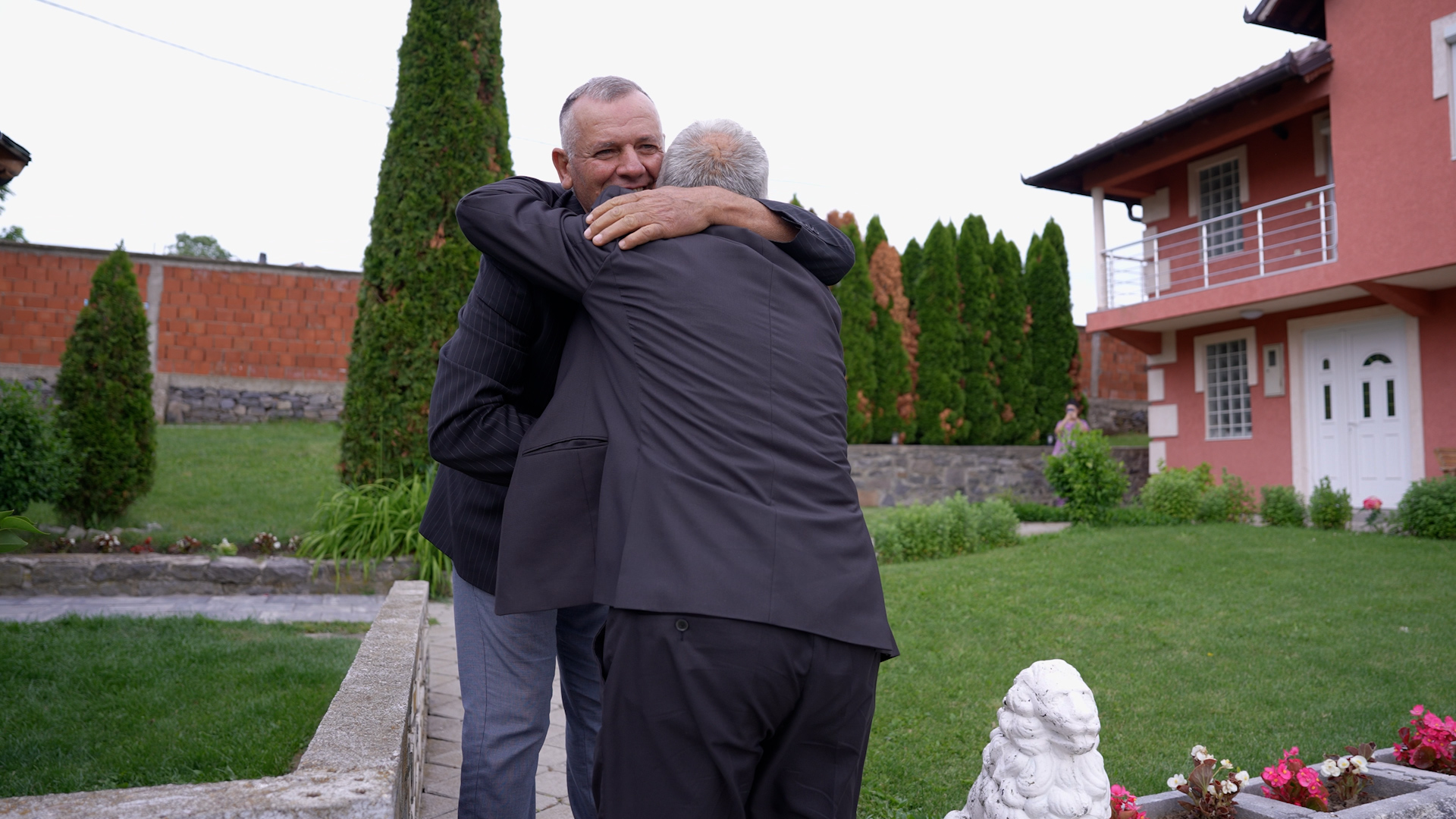
Reunion of Abaz Zahiti and Salih Morina, June 2024. Photo:BIRN
“I could recognize the place”
After a long time, a reunion occurred in their yards over coffee..
Their children are married, they have grandchildren, and they haven’t seen each other in years. The reunion included conversations about how they remember the old times spent together and about the migration of their children.
For Salih Morina, returning to his old friend’s cozy courtyard was as thrilling as it was unexpected. He still recognized the place, even though there were now three new houses with modern facades in the yard.
“I could recognize the place,” he replied when Abaz Zahiti asked him, “do you know the place because they are new?” while they were talking about the flour they had shared together.
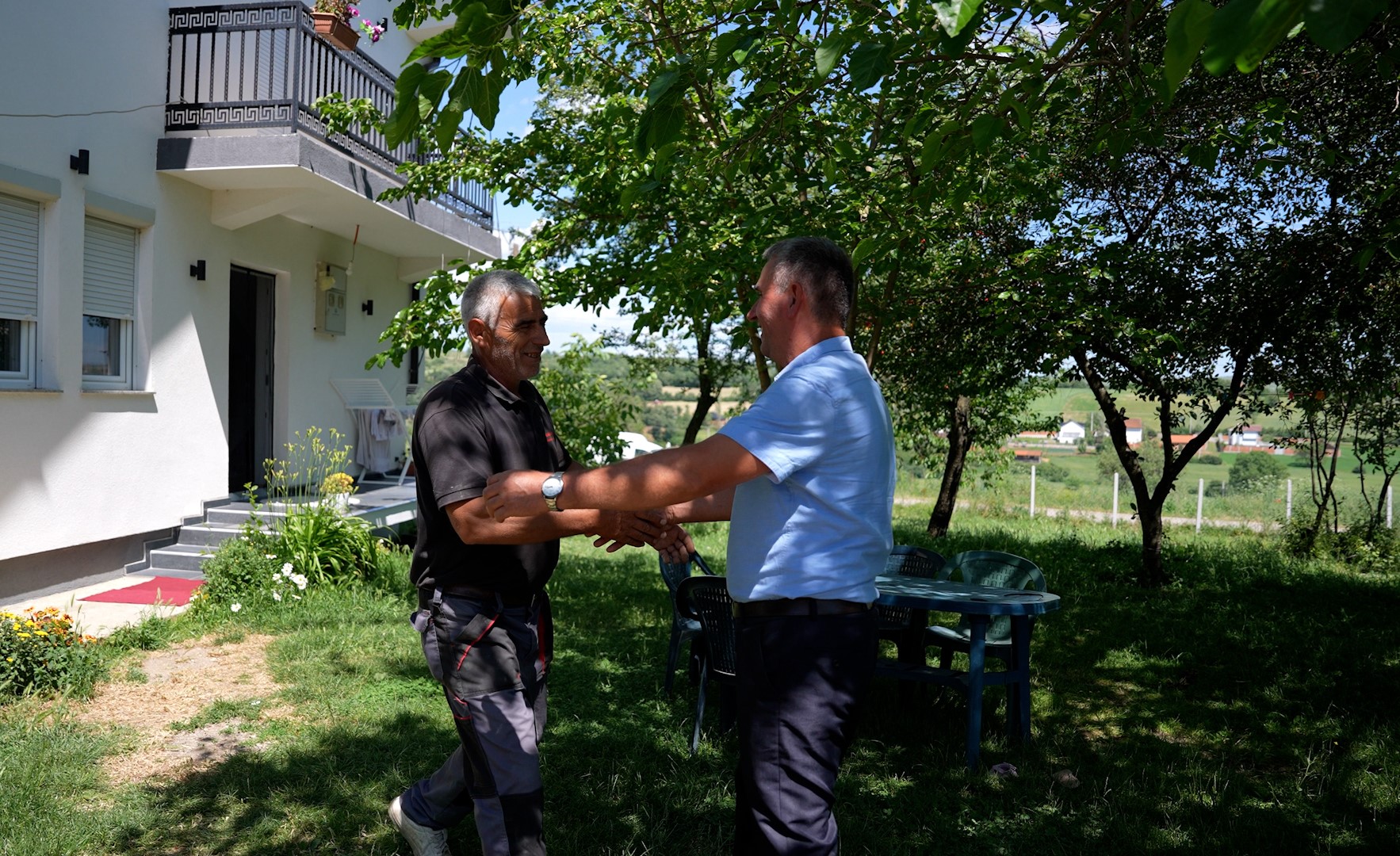
Reunion of Fatmir Kovaçi and Ramë Hamiti, June 2024. Photo:BIRN
The embrace between them was warm. They spread their arms wide and long to squeeze each other as hard as possible, to commemorate all those moments that they had experienced together two and a half decades ago.
Morina was also excited on the way to Kçiq. He knew the village like the back of his hand, “here I eated and drank.” Abaz Zahiti also welcomed the meeting with the same amount of excitement, who did not believe that he would see him.
Unlike these first ones, Fatmir Kovaçi and Ramë Hamiti had kept their friendship stronger. Just as the short mountain road from Novolan to Vajnikë has been well-maintained, so too has the friendship between the two. However, even their reunion brought them back to the same point, to the memories of the past. This time they did not meet in the house where Hamiti had left memories but in the one he had built after the war.
Whether they live in old or new houses, the four preserve the memories and connections that were created because of the war.





